- Mudra Benefits for Hair
- Prithvi Mudra
- Prasanna Mudra
- Prana Mudra
- Vayu Mudra
- Gyan Mudra
- Lifestyle Changes
- FAQs
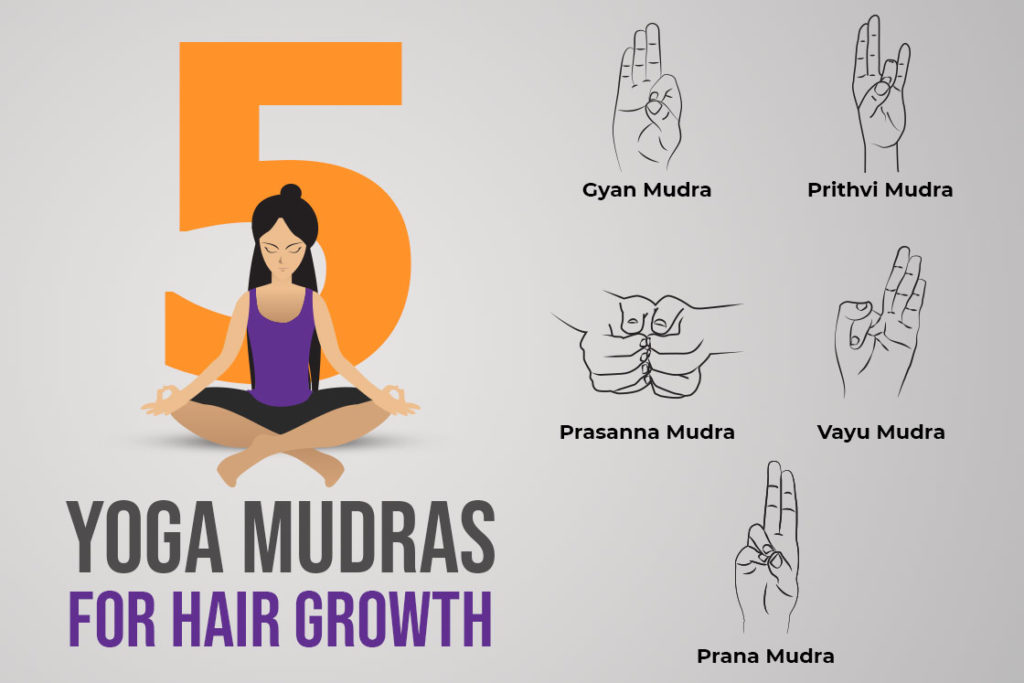
Hair loss and thinning are common issues that affect people of all ages. While many turn to expensive treatments and products, the root cause often lies deeper within the body. Yoga mudras offer a natural and holistic approach to promoting hair growth by balancing the body’s energy and improving blood circulation to the scalp. These simple hand gestures can enhance the flow of vital nutrients, restore balance to the doshas, and encourage healthier, stronger hair.
In this article, we’ll explore specific yoga mudras that can support hair growth and improve overall hair health.
How do yoga mudras help with hair growth?
Yoga mudras, which involve specific hand gestures, enhance hair growth by improving blood circulation to the scalp and balancing internal energies. This stimulates the hair follicles, promoting stronger, healthier hair growth.
- Boosting Blood Flow: Certain yoga mudras enhance circulation to the scalp, ensuring that vital nutrients reach weakened hair roots. Improved blood flow helps in revitalizing hair follicles, leading to healthier and stronger hair.
- Balancing Body Elements: Mudras can restore the balance of the body’s five elements—earth, water, fire, air, and space. Hair loss and premature greying often result from imbalances in these elements. By practicing mudras that increase prana (life force energy), you can address these imbalances and support hair health.
- Stimulating Nerves: The gentle pressure applied during mudra practice stimulates specific nerves connected to the scalp. This stimulation helps tackle hair issues at their core, promoting a nourished scalp and shiny, lustrous hair.
Ayurvedic principles behind mudras
Mudras are deeply rooted in Ayurvedic principles, especially the concept of Doshas. In Ayurveda, Doshas are vital energies that shape our physical and mental well-being. They arise from the combination of five elements: Agni (fire), Jal (water), Vaayu (air), Prithvi (earth), and Akash (ether/space).
Hair issues often result from imbalances among these elements. For example, an excess or shortage of a specific element can disrupt balance, leading to problems like hair loss or greying.
Each fingertip represents these five elements. Performing mudras alters the positioning of fingers, creating subtle vibrations that channel energy to specific areas. This process helps balance the Doshas and address underlying causes of hair problems.
By stimulating the fingertips through mudras, you can manage imbalances in Vata, Pitta, and Kapha, the three Doshas formed by combinations of the five elements. This practice helps regulate the body’s energies, enhancing hair health and preventing hair loss caused by Dosha imbalances.
5 Best yoga mudras for hair growth
The following mudras can help you fight most hair problems and ensure hair growth.
1. Prithvi Mudra
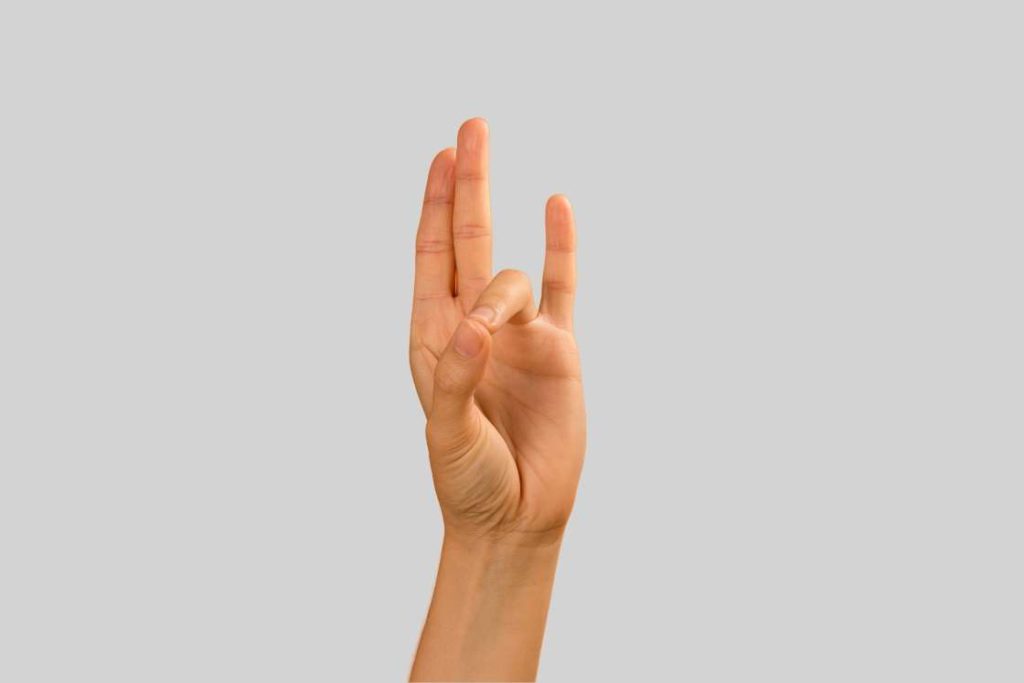
Prithvi Mudra enhances the earth element, which strengthens hair roots and reduces premature hair fall by restoring moisture and improving blood circulation to the scalp. By stimulating the fingertips, this mudra balances the body’s energies, promoting healthier and more resilient hair growth.
How It Is Beneficial for Hair
- Prithvi mudra reduces premature fall and graying of hairs.
- It gives the hair a strong foundation and strengthens it from the roots up. As a result, hair is less likely to break and has a longer lifespan.
- It restores moisture in the scalp and reduces inflammation.
- It enhances follicular blood circulation and encourages fresh hair growth.
How to do it
- Sit in easy pose (sukhasana) with your hands on your knees, palms facing up.
- Make prithvi mudra by touching the tip of the ring fingertip and the thumb while keeping the other fingers straight yet relaxed.
- Close your eyes and focus on your breathing.
When to do it
- Practice Prithvi mudra for 10-15 minutes thrice a day. Start with dedicating 5 minutes each day, twice a day, and gradually increase the time.
- The best time to practice it is early morning between 4-6 am every day.
2. Prasanna Mudra
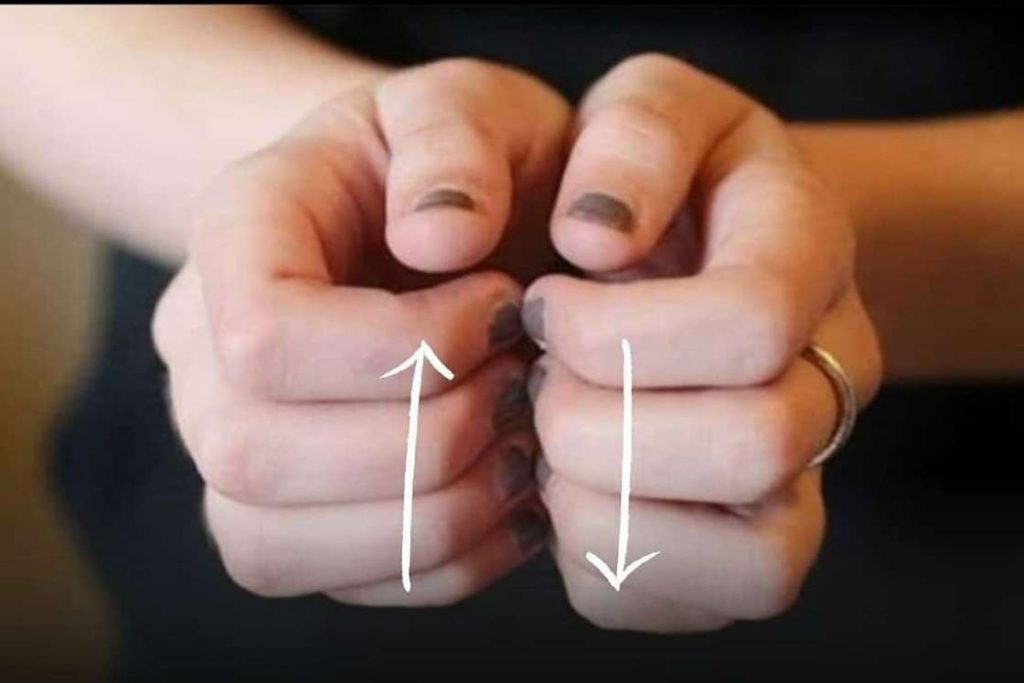
Prasanna Mudra, or Balayam Yoga Mudra, involves rubbing the fingernails together to stimulate hair follicles and enhance blood circulation to the scalp. This practice helps restore the body’s natural balance, counteracting the effects of poor diet, a sedentary lifestyle, and environmental stressors, thereby promoting healthier and more vigorous hair growth.
How It Is Beneficial for Hair
- Prasanna mudra improves blood circulation and nutrient supply in the scalp and hair roots, resulting in thicker, healthier hair.
- Reduce the frequency at which your hair greys.
- Reduces hereditary hair loss caused by alopecia areata, male pattern baldness, and other conditions.
- It supports brain health and encourages a good night’s sleep.
How to do it
- Bring the palms in front of your chest.
- Curl your fingertips and join your nails together. Your thumb will be kept straight.
- Rub the nails up and down vigorously to create friction.
When to do it
- You can practice this mudra at any time of the day.
- Perform the Prasanna mudra for at least 10-20 minutes each day.
- It is best to practice it on empty stomach.
3. Prana Mudra
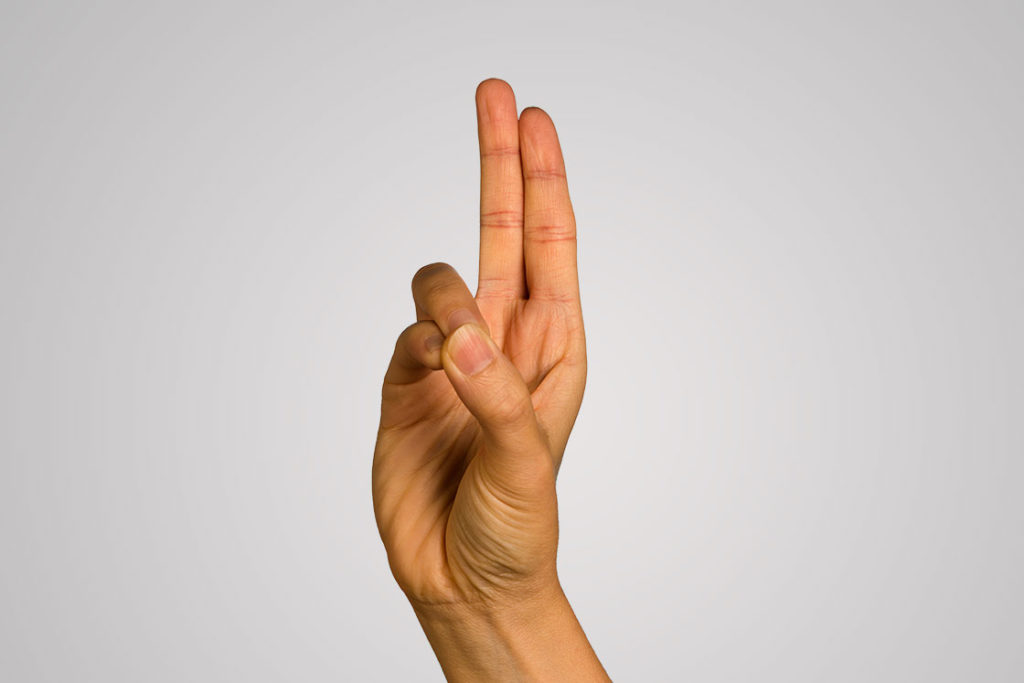
Prana Mudra stimulates the flow of vital energy, enhancing overall vitality and well-being, which can positively impact hair health. By increasing Kapha dosha and reducing Pitta dosha, this mudra helps balance the body’s internal environment, promoting a healthier scalp and stronger hair growth. Regular practice improves circulation and revitalizes hair follicles, contributing to reduced hair fall and enhanced hair growth.
How It Is Beneficial for Hair
- Reverses and decreases greying of hair.
- It helps to strengthen and lengthen hair.
- Better prana flow nourishes hair follicles, which enhances hair growth overall.
- By restoring Prana, it aids in enhancing the vitality of your scalp tissue.
- Strengthens the roots to treat hair thinning and dryness.
How to do it
- Sit in a meditative pose with straight back.
- Place your hands on your knees with palms facing upwards.
- Join the tip of the ring and index finger to the thumb. The rest of the fingers will remain straight.
- Focus on your breathing while keeping your eyes closed.
When to do it
- The best time to practice this mudra is in the morning for 15-20 minutes thrice a day or for 30-45 minutes at a stretch once a day.
- The practice of prana mudra should be avoided during the evenings and at night.
- If you are overweight, are prone to weight gain, or have excessive Kapha dosha, practice this mudra with caution.
4. Vayu Mudra
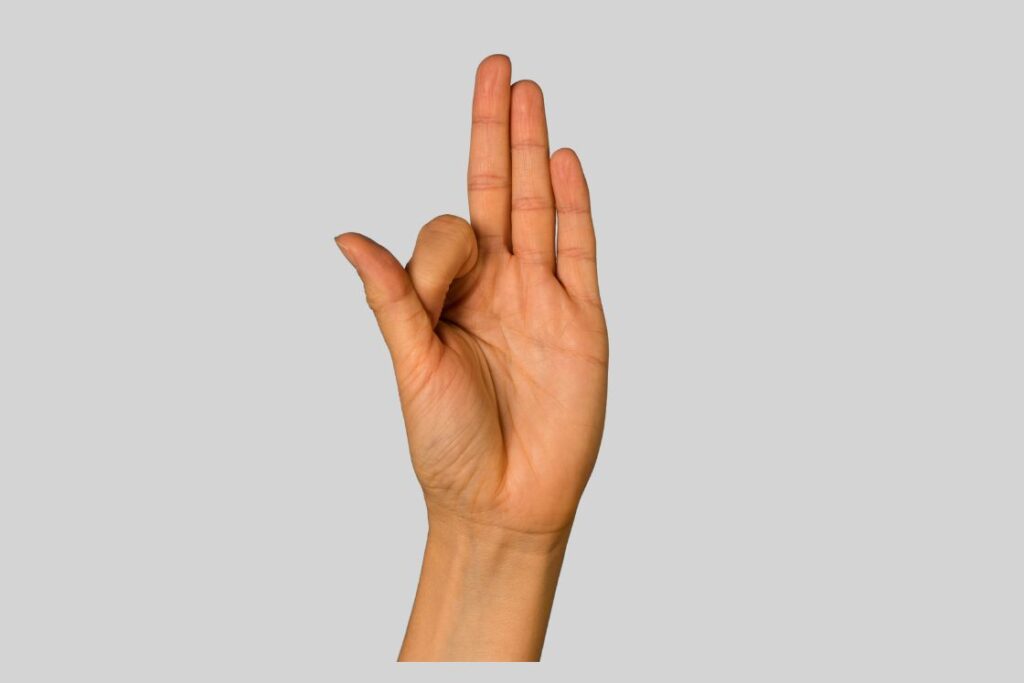
Vayu Mudra helps balance the air element and reduce excess Vata dosha in the body, which can improve overall hair health. By alleviating issues related to excess air, such as dryness and brittleness, this mudra supports a healthier scalp and reduces hair fall. Regular practice of Vayu Mudra enhances blood circulation to the scalp, nourishing hair follicles and promoting stronger, more vibrant hair growth.
How It Is Beneficial for Hair
- It corrects the mental negativity that produces mental sickness and, as a result, hair loss.
- Hair is nourished, which helps to treat dry scalp and hair.
- Controls itching and hair loss on the scalp.
How to do it
- Sit in a meditative pose with a straight back.
- Place your hands on your knees with palms facing upwards.
- Bend your index finger so that the tip touches the back of the thumb. Put your thumb on the middle of the folded index finger.
- Keep the rest of the fingers as straight and relaxed as possible
- Focus on your breathing while keeping your eyes closed.
When to do it
- You can practice the mudra at any time of the day.
- Practice Vayu Mudra for 10-15 minutes thrice a day or for 45 minutes at a stretch daily.
- You should stop practicing it once your hair fall problem has been resolved, as it may cause an imbalance of Vaayu elements in your body.
- When practicing Vayu mudra, don’t put extra pressure on your index finger.
5. Gyan Mudra
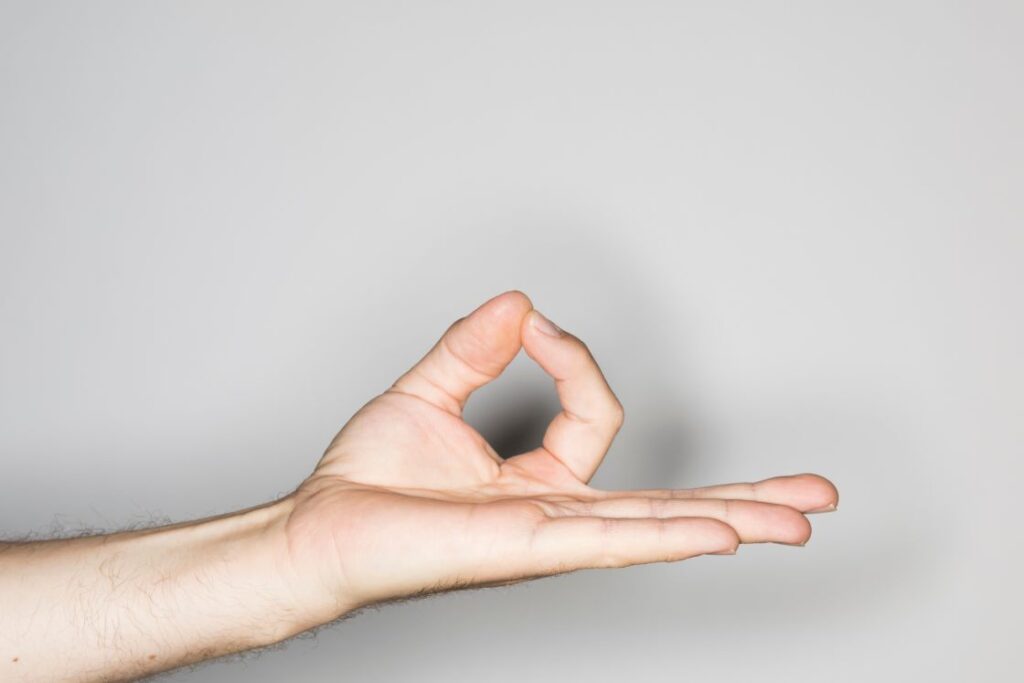
Gyan Mudra promotes mental calmness and stress relief, which is crucial for healthy hair growth, as stress can contribute to hair loss. By reducing worry and tension, this mudra helps create a more balanced internal environment, supporting overall well-being. Regular practice enhances relaxation and mental clarity, which can improve scalp health and encourage stronger, more vibrant hair growth.
How It Is Beneficial for Hair
- It aids in controlling and reducing stress-related hair loss
- It keeps the mind calm and also treats insomnia.
- Gyan Mudra balances the hormonal disturbances, effectively controlling hair fall.
How to do it
- Sit in a meditative pose with a straight back.
- Place your hands on your knees with palms facing upwards.
- Join the tips of the index finger and the thumb.
- Keep the rest of the fingers straight and relaxed.
- Focus on your breathing while keeping your eyes closed.
When to do it
- You can practice the mudra after meals.
- Practice the mudra for 10-15 minutes thrice a day or for 45 minutes at a stretch daily.
- People with excess Vata should be cautious when practicng this mudra.
Lifestyle changes to enhance mudra practice
To maximise the benefits of your yoga mudra practice for hair growth, consider incorporating these lifestyle changes.
- Include Zinc and Iron-Rich Foods: Add spinach, wheat germ, cashews, and lentils to your diet for better hair tissue growth and repair.
- Stop Smoking: Avoid cigarettes to prevent damage to hair follicles.
- Oil Your Scalp Regularly: Follow Ayurvedic practices by oiling your scalp almost daily or at least twice a week.
- Try Shirodhara Therapy: Use this Ayurvedic treatment to strengthen hair roots and improve scalp health.
- Incorporate Yoga Poses: Add forward bends and inverted poses to your daily routine to enhance blood flow to the scalp.
Conclusion
Integrating yoga mudras into your routine offers a natural and holistic approach to promoting hair growth. By boosting circulation, balancing body elements, and stimulating key nerves, mudras can contribute significantly to healthier, stronger hair. Combining these practices with beneficial lifestyle changes will further enhance your results, leading to a fuller, more vibrant head of hair.
FAQs
Mudras increase blood flow to the scalp and stimulate nutrition delivery to the weak hair roots which result in low hair fall. While performing a mudra, the slight pressure we put on the various parts of fingers stimulates specific nerves, which directly impact the hair roots on the scalp.
It’s typical to lose 50 to 100 hairs per day. Losing hair strands may be more evident in persons with longer hair. Excessive hair shedding occurs when the body sheds significantly more hair each day.
While you can practice yoga mudras almost every day and at any time, it is advisable that you stick to one or two mudras over a period of time. This is because it takes a few days or weeks for a mudra to show its benefits, and switching between multiple mudras can disrupt the working of the energy.
While mudras can be effective, combining them with a healthy lifestyle, proper diet, regular scalp oiling, and other treatments like Ayurvedic therapies can enhance overall hair growth results.
Mudras are generally safe and have no known side effects. Consult a healthcare provider if you have specific concerns.
Yes, mudras are safe for children and can be practiced with appropriate supervision.





For grey hairs, for how much time Balayam yoga mudra should be performed?
As you have mentioned in the previous comment that each hand mudra should be practiced for 30-45 minutes, which 2-3 Mudras should I start with? How to schedule time/days so that I can do all mentioned Mudras?
If you have a morning yoga routine, then I would say start with prana mudra with sama vritti pranayama and after that do Prithvi mudra in simple sitting meditation. It’s a morning routine; “how much time for each mudra?” – you can manage according to your schedule. Balayam yoga mudra you can do anytime, it doesn’t need to be done with meditation or yoga. It would be good however if balayam mudra is done for 30 minutes in one stretch. Aim to do it 2 times, overall one hour a day.
Sir, your article on Mudras for Hair Growth helped me tremendously to remedy my issue of hair, for which I’m absolutely grateful. The best thing about that article was that every mudra was specified as to how it would benefit different problems regarding hair loss. I.e. Vayu Mudra helping with thinning hair specifically.
My question to you is that, after updating the article, why did you remove that vital information? Yours was the only page that had overt knowledge regarding each mudra specifically aiming towards hair treatment, nowhere else had I ever heard that Vayu Mudra helped with thinning hair, only your article did.
My question to you is, why did you remove that info? The new article isn’t nearly as in-depth. I’m speaking for all people facing such hair issues and looking towards solutions. I just wish that everyone had explicit access to the knowledge you impart, just like I did.
Please be absolutely specific each and every time you make such “5 Mudras for….” Or “8 Mudras for….” Collective articles, as it would help us all tremendously.
Thank you, Sir.
In fact, I already owed you another thank you for your assistance. so, thank you.
Can we practice all the 5 yoga mudras to stop hair fall in a single day? If yes for what duration we need to practice the same.
Any yoga mudra or other yoga exercise doesn’t show results in a single day.
It’s recommended to practice a mudra consistently for some time (10-15 days) to check how it works for you! Doing all 5 mudras together in a day will not be of much use.
Each hand mudra should be practiced for 30 to 45 minutes.